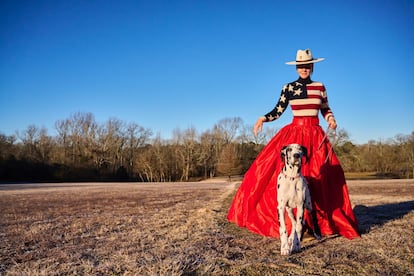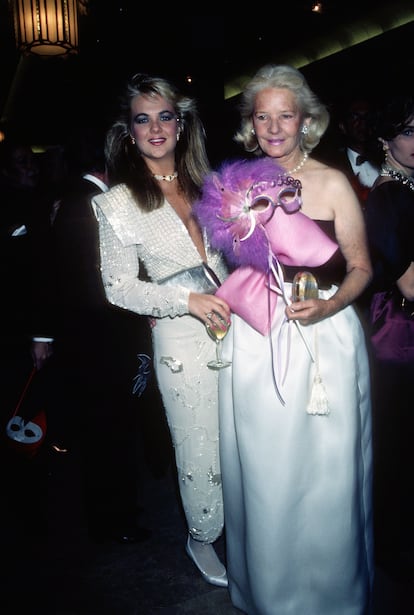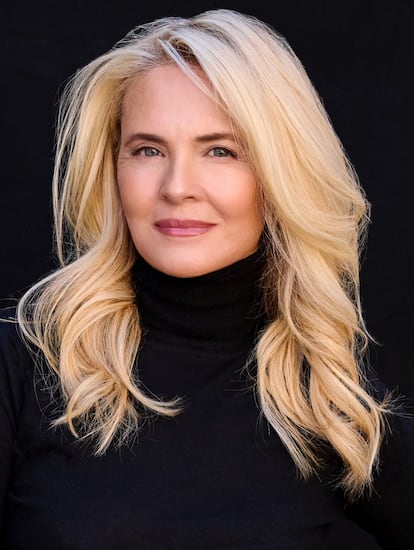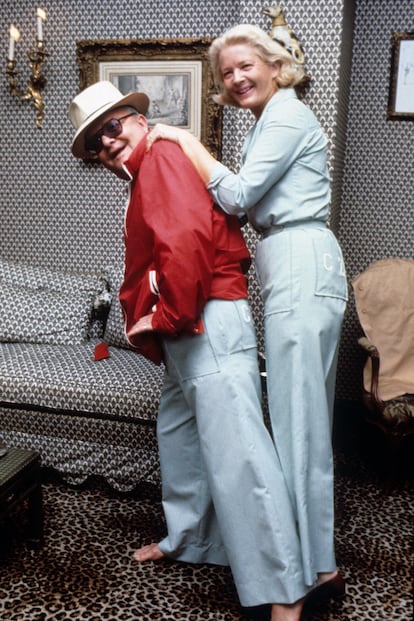Cornelia Guest, Truman Capote’s last swan: ‘He was desperate to write and didn’t consider the consequences’
Her family’s famous surname is back in fashion thanks to ‘Feud: Capote vs. The Swans,’ Ryan Murphy’s new series that chronicles the famous writer’s fall from grace. Cornelia Guest remembers him as a ‘generous and sweet’ friend, but she assures EL PAÍS that she will never tell his darkest secrets to a journalist

“At the age of 13, I started wearing braces. I felt horrible, like an ugly duckling. One day, Truman took me to lunch at Le Cirque on the Upper East Side, to cheer me up. We had such a good time,” recalls Cornelia Cochrane Churchill Guest, 60, in a telephone conversation with EL PAÍS. The New York-born socialite — an actress, horse rider, animal rights activist, designer and writer — has never forgotten the day when Truman Capote transformed her into a swan (he called all his female friends “swans”). The anecdote summarizes the immense power that the writer exercised over the women of New York high society, their husbands and their daughters.
Cornelia Guest is the only daughter of C.Z. Guest, one of the closest friends of the man who wrote In Cold Blood (1965) and Breakfast at Tiffany’s (1958). She grew up surrounded by celebrities: Andy Warhol helped her color, the designer Halston taught her to walk in heels, Rudolf Nuréyev took her dancing and the Duke and Duchess of Windsor — her godparents — visited her at Templeton, her family’s mansion on Long Island. “I’ve met a lot of people, but everybody always asks me about Truman. For me, he was a good friend of my family, a wonderful friend,” she says, from her home in Dallas, Texas.
The Guest surname is back in fashion, thanks to Feud: Capote vs. The Swans, Ryan Murphy’s new series that chronicles Capote’s fall from grace. Directed by Gus Van Sant, the fictional series focuses on 1975, the year in which the writer published La Côte Basque, 1965, an excerpt from Answered Prayers, an unfinished novel by Capote “written in code,” with Proustian aspirations. The novelist thought that if Marcel Proust had written In Search of Lost Time — inspired by the French aristocracy — he could base his roman à clef on his upper-class American friends. La Côte Basque — named after the elegant restaurant where the author used to have lunch with his swans — collected some of the most scandalous secrets of his richest and most famous confidants: Babe Paley, Slim Keith, Lee Radziwill, Gloria Guinness, Gloria Vanderbilt, Ann Woodward…

“I haven’t seen the series yet,” admits Cornelia Guest, considered one of the first “it girls” or “celebutantes.” She’s been very busy with her own brand of cruelty-free purses, a collaboration with designer Adrienne Landau and the filming of Oh, Canada, a Paul Schrader film, in which she stars alongside Richard Gere, Jacob Elordi and Uma Thurman. “They told me that, in the series, there’s a girl who plays me. I’ll have to see it.”
Actress Chloë Sevigny plays her mother, one of the few swans who was saved from Capote’s indiscretions. “Truman didn’t reveal anything about my mother in Answered Prayers for one simple reason: she didn’t tell him anything,” Guest notes. “I think he respected my mother a lot, precisely for that reason: because she never talked to him about her private life.”

Cornelia Guest was only 13-years-old when the first sections of Answered Prayers came to light. The title of Capote’s novel was a tribute to Saint Teresa of Ávila — “more tears are shed for answered prayers than for unanswered ones” — and to the author’s connection with Spain (his stepfather, José García Capote, was from the Canary Islands). “I was very little and I didn’t find out about the scandal. But, when I was older, my mother told me about it. She said: ‘It was the fault of those ladies, who spoke with a journalist. Never discuss your private life with a journalist.’ Truman was a great friend to my mother, but she always knew that, sooner or later, he would publish something. She told me: ‘They’re always telling him about their private lives, and he’s a writer! There’s no way he’s not going to use that in his books.’”
For decades, Capote felt like the king of the jet set, perched on the shoulders of his rich friends: he sailed on their yachts, flew on their private planes, slept in their mansions and listened to all of their secrets (while taking notes). But the dream of writing the great American novel took the crown from him — his muses didn’t forgive the betrayal and condemned him to ostracism. It was social suicide. “He never imagined it would end like this. He was desperate to write and didn’t consider the consequences. He was convinced that his friends wouldn’t realize that the fictional characters were based on them. It went wrong,” Guest explains. “But it wasn’t his fault. It was the fault of those women, who put themselves in that position. If I tell you my darkest secrets, then I shouldn’t be surprised if I see them published in a newspaper.”

In the series Feud: Capote vs. The Swans, the author is portrayed as a cold and calculating man, at times cruel to his friends. But Guest doesn’t remember him like this: “He was always kind, generous and sweet with me. He always came to talk to me and give me advice about boys. I just wanted to go out to lunch with him and talk about boyfriends and gossip.” In the summer, they ate at Bobby Van’s in Bridgehampton. In the winter, it was Le Cirque, in Manhattan. “His favorite dish was pasta primavera,” she recalls.
Babe Paley and the other swans withdrew from the writer’s world. C.Z. Guest — who, in her youth, had performed on Broadway with the Ziegfeld Follies and had posed nude for Diego Rivera — stayed by his side. “Those women weren’t my mother’s friends, they didn’t even like each other. My mother was a country woman: she enjoyed gardening, riding horses and going to horse shows in Virginia. She didn’t spend her days having lunch in New York — she wasn’t that kind of woman,” her daughter clarifies. In February 1976 — amidst the scandal unleashed by Answered Prayers — New York Magazine published an extensive report titled “Capote Bites The Hands That Fed Him.” The upper-class skinned him alive. C.Z. was one of the few who didn’t attack him. “Everyone knows the man’s a professional and they told him those things anyway. He’s a dear friend of mine, but I wouldn’t discuss very private matters with him,” she said.
The expulsion from high society pushed Capote into alcoholism and drugs, a spiral of addictions that didn’t allow him to finish Answered Prayers. C.Z. Guest and her husband — the heir and polo player Winston Frederick Churchill Guest, a distant cousin of Winston Churchill — took him to Hazelden, a famous rehabilitation center in Minnesota. “My father adored him for his intelligence and wit and took personal care of him. He admired Truman because he didn’t miss anything,” Guest says. When the novelist left the rehabilitation center, the Guests were waiting for him at the Studio 54 nightclub to dance and celebrate his recovery.

In 1982 — just two years before the writer’s death — C.Z. Guest invited Capote to his daughter’s debut at the Waldorf-Astoria Hotel. “He had a great time. He loved being with young people. He was a voyeur of life, like almost all writers,” recalls Cornelia Guest, then baptized by The New York Times as “the debutante of the decade.”
“Truman was happy when he was surrounded by youth and beauty. One day, he came to see me at an equestrian competition. I found him helping the riders polish their boots. My mother told me: ‘He’s here to see those handsome boys.’ He was so funny and I was so innocent.”
She doesn’t remember the last time she saw Capote, nor the last conversation they had. “I was very young,” she laments. But she hasn’t forgotten her mother’s words: “Never discuss your private life with a journalist.”
Sign up for our weekly newsletter to get more English-language news coverage from EL PAÍS USA Edition
Tu suscripción se está usando en otro dispositivo
¿Quieres añadir otro usuario a tu suscripción?
Si continúas leyendo en este dispositivo, no se podrá leer en el otro.
FlechaTu suscripción se está usando en otro dispositivo y solo puedes acceder a EL PAÍS desde un dispositivo a la vez.
Si quieres compartir tu cuenta, cambia tu suscripción a la modalidad Premium, así podrás añadir otro usuario. Cada uno accederá con su propia cuenta de email, lo que os permitirá personalizar vuestra experiencia en EL PAÍS.
¿Tienes una suscripción de empresa? Accede aquí para contratar más cuentas.
En el caso de no saber quién está usando tu cuenta, te recomendamos cambiar tu contraseña aquí.
Si decides continuar compartiendo tu cuenta, este mensaje se mostrará en tu dispositivo y en el de la otra persona que está usando tu cuenta de forma indefinida, afectando a tu experiencia de lectura. Puedes consultar aquí los términos y condiciones de la suscripción digital.









































